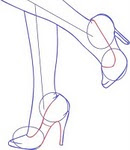
I have a confession: Although I mention hard hats in the title of this blog, I must admit I’ve hardly ever worn one in my career. As a student I wore a hard hat once during a site visit to a petro-chemical plant. The only other time I needed one was for a few months when a section of the washing powder factory I worked in was under construction. Hard hats are not too bad. I actually think they’re kind of hot in a tom-boy sort of way. (And its fun to knock yourself on the head with your fist when you’re wearing one because you don’t feel anything and you hear that hollow sound from inside the hat. If you’ve ever worn one, you must’ve done that at least once. Or is it just me?...) The only drawback is hard hat-hair. If you have big hair, guaranteed it’ll be flattened after an hour or so of wearing one.
 Hairnets on the other hand… Hairnets just look ridiculous. And “hairnets and heels” just doesn’t sound as catchy. They don’t hurt, or itch or make you sweat but I just hate them. I had the misfortune of spending the greater part of last year wearing a hairnet. I worked in a margarine factory and understandably human hair is the last thing consumers would like to find buried in their tubs of low fat spread. Well, actually the last thing is probably a cockroach… But even if you’re bald, upon entry to the plant you pull on a hairnet.
Hairnets on the other hand… Hairnets just look ridiculous. And “hairnets and heels” just doesn’t sound as catchy. They don’t hurt, or itch or make you sweat but I just hate them. I had the misfortune of spending the greater part of last year wearing a hairnet. I worked in a margarine factory and understandably human hair is the last thing consumers would like to find buried in their tubs of low fat spread. Well, actually the last thing is probably a cockroach… But even if you’re bald, upon entry to the plant you pull on a hairnet.
Fine. But I still hate them. I hope I never wear another hairnet in my lifetime.
Now would be a good time to reveal my ethnicity as it may help to contextualise my specific disdain for hairnets. I am a coloured** woman from Cape Town. Cape Town is home to, and famous for, it’s many fisheries and fish shops. Many coloured women work in fish shops and they all wear hairnets. I think the first time I ever saw a hairnet was on the head of a woman who worked in a fish shop. I associate hairnets with working in fish shops. For years I strived to get good grades so that I could go to university, get a degree and a good job so that I would not be a woman in a fish shop. Or a cashier at Shoprite. Or a factory worker, bad as that may sound. Yes, I guess that makes me a snob. And yes, I see the irony that I ended up in a factory anyway. Wearing a hairnet.
Consolatory PPE perks: Hairnets are excellent for masking a bad hair day. On a good hair day they do not cause the same degree of damage as hard hats.
Alternative uses: I know of two: (1) Socks. I worked at a personal care products factory (shampoo, lotion, deodorants) where all staff were meant to wear hairnets. Instead we were issued with baseball caps because management realised they were spending way more than anticipated on replenishing hairnets. Why? The operators were wearing them as socks. Secret socks. The secret being that they were stealing PPE to save… what? Money on washing powder? (2) Food cover. My mom uses hairnets to cover dishes of food when there are flies around. Unused hairnets, by the way. My aunt is a QA (Quality Assurance) manager at a food products manufacturing factory, and she provides them to the women in my family for this purpose. I’m not sure if management knows.
**For the non-South African readers: Please note that in South Africa “coloured” is a legitimate label for people of mixed racial origin and most people do not view it as any more as offensive than the terms “black” and “white”. The coloured population is considered to be previously disadvantaged as a result of the Apartheid system. Levels of affluence have been on the rise since the end of Apartheid but many communities are still impoverished and suffering the social effects of forced removals of the previous era.












